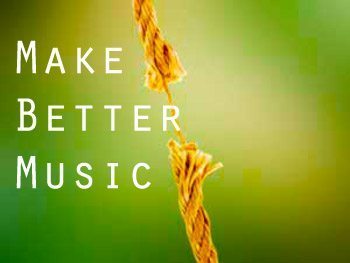[dropcap style=”font-size:100px; color:#992211;”]A[/dropcap]fter a slightly wild couple of days defending myself from various opinions on last weeks article, I’ve decided to go over what I was saying and clarify a few points that I possibly didn’t make clear enough.
Firstly, by talking about musicians being deluded by software, I of course did not mean EVERYONE! The point I was trying to make was this: More people than ever are now using only software to make music, and the large helping hand that it provides may make people think they a creating more than they are. All the sequencing software I know of steers you very heavily unless you have a strong sense of what you want and how to achieve it.
If you do not have this urge and the know-how to build your track your own way… you will chugging down the same train tracks as millions of other people. This is the exact point that causes me concern. So many people who make music this way have no idea how much the software informs the music they make.
This leads to so many tracks that are exactly like loads of tracks by other users of the same software. I think that this is wasteful and a shame. Lots of time wasted, and lots of hopeful artists wondering why people don’t appreciate their genius. If you haven’t experienced working outside of the software you may not see the scaffolding that is there which you have been happily building on. You might think you are the designer and the builder – but in truth you have barely been either.
What is the importance of this? There is no world shattering importance to it on a wide scale – just a small effect on some individuals. It’s just an observation and I would just personally love to be able to help people be more inspired and creative and not waste time thinking they are doing this when they are not!
To answer a few points that were brought up in various chats about this:
I guess you disapprove of amateurs like me meddling with music software for fun then?
No! The fact that music software enables all kinds of people to make music in way they couldn’t before is remarkable and wonderful. My worry is more for people that are in the middle of the scale – got a few skills and can make some decent sounds and perhaps take it all a bit more seriously. I think they are at the most danger of deluding themselves.
Does it really matter what anyone else thinks of their own proficiency?
It’s not about how good you think you are, or how good you “are” – it’s about the end result. I think it’s a shame for people to be steered by software into creating something they think is by them, but which they really had very little to do with.
It’s just a structure within which people are creative.
It’s like saying that the piano creates people who are deluded because it makes a nice noise that’s in tune when you press the keys. Actually, I think it is more sinister than that – it’s more like a pianola that plays itself with minimal human interference. In some senses people end up like the person turning the handle on the pianola and thinking they are playing the music.
Couldn’t you argue that the ease of getting good sounds in software levels the playing field? It’s back to the nuts and bolts of songwriting.
Yes, that would be good, but alas the state of songwriting in most electronic music genres is not spectacular in my opinion – but at least people are talking about it and some people are working on that side of things. Well structured, well written music does not need to be dry and academic – the behind the scenes work should lift it out of the ordinary and into the sublime! That’s why I’m interested in learning!
Music can be all sort of things, but it often gets divided into “art music” and “entertainment” – head and heart music. Neither is better, everything depends on how you feel and what you want at that particular moment in time. It can be one or the other, or both – and I love learning about all of it. I hope to spread a little of my enthusiasm for this subject in these articles, which leads nicely on to possibly the best comment I had on last weeks words:
Why don’t you say something positive about it then?
Hopefully todays rant will balance things out – it was all meant to be positive – just a warning not to get complacent with music software…it’s very easy to let the software rule your ideas. Let you music come from you through the computer – not the other way round!
Image: Francesco Marino / FreeDigitalPhotos.net

David Learnt composition (harmony, counterpoint and orchestration) to degree level through studying Schoenbergs Fundamentals of Musical Composition, the classic text on twentieth century harmony by Vincent Persichetti, Henry Mancini’s Sounds and Scores, Rimsky-Korsakov’s excellent books on orchestration as well as studying any scores that intrigued me. He is a founder member of two bands, avant pop duo Cnut, and orchestral doombience outfit Regolith, and have performed across Europe with them.


















